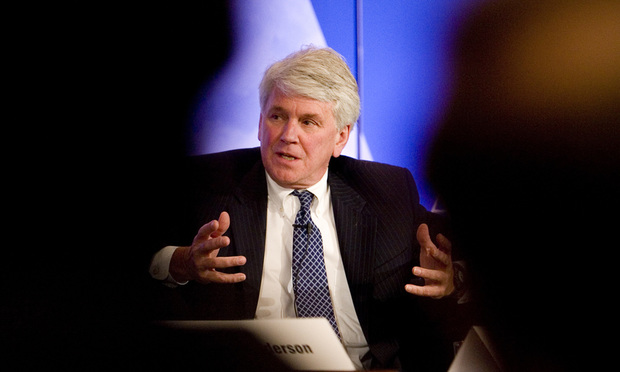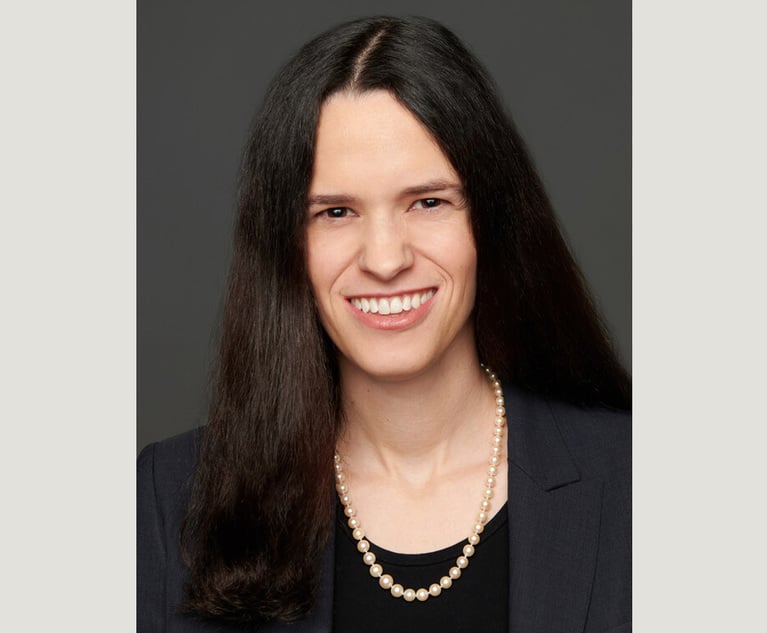Greg Craig's Defense Closes With Swipe at Star Prosecution Witnesses
William Murphy of Zuckerman Spaeder called one of the witnesses an "occupational liar," and the other a "con artist" and "congenital liar."
September 03, 2019 at 07:18 PM
7 minute read
 Gregory Craig speaking in Washington in 2008. Photo: Diego M. Radzinschi/ALM.
Gregory Craig speaking in Washington in 2008. Photo: Diego M. Radzinschi/ALM.
As arguments in Greg Craig's three-week trial came to a close Tuesday, his defense lawyer urged jurors to consider the former Obama White House counsel's character and a career "built on honesty and trust" as they weigh whether he misled the Justice Department about his past work for Ukraine.
In a more than 90-minute closing argument, defense lawyer William Murphy drew a sharp contrast between Craig and a pair of star witnesses for the prosecution. Murphy, a Baltimore-based partner at Zuckerman Spaeder, called one of the witnesses an "occupational liar," and the other a "con artist" and "congenital liar."
"What value does 50 years of a life well lived have on the scales of justice as you weigh the evidence? I suggest to you it weighs a lot," Murphy said.
Murphy's closing argument punctuated a trial that revisited a project Craig led for Ukraine in 2012, when he was a partner at Skadden, Arps, Slate, Meagher & Flom. Craig agreed that year to prepare a report on the widely criticized prosecution of former Ukrainian Prime Minister Yulia Tymoshenko, a political rival of the country's Russia-aligned president at the time, Viktor Yanukovych.
In April, Craig was charged with misleading the Justice Department about his role in the public release of the report to avoid disclosing his Ukraine work under the Foreign Agents Registration Act, a decades-old law designed to shed light on public relations and lobbying for overseas powers. Craig, 74, was not charged with failing to register as a foreign agent, but his case is seen as an early test of the Justice Department's stepped-up enforcement of FARA.
In his closing argument Tuesday, Murphy urged the jurors to clear Craig and prevent the prosecution from "sounding a horrible false note at the end of an incredible career of honor, service and integrity." Murphy argued that Craig was entirely truthful with the Justice Department when it inquired about his dealings with reporters during the public rollout of the 186-page Tymoshenko report.
Craig's case grew out of the special counsel investigation into Russian interference in the 2016 presidential election, a probe that resulted in the conviction of former Trump campaign chairman Paul Manafort on charges related to his work for Ukraine. In 2012, as a top adviser to Yanukoych, Manafort played a critical role in retaining Craig and Skadden to review the Tymoshenko prosecution. The scrutiny of Manafort's work in Ukraine led the investigators to return to Craig's communications with the Justice Department as it inquired about whether he was required to register under FARA. Robert Mueller's team referred the Craig investigation to the U.S. attorney's office in Manhattan, but it was ultimately career prosecutors in Washington who took it to trial.
In the course of a three-week trial, prosecutors attempted to portray Craig as being more closely involved in Ukraine's public relations strategy for the report than he led the Justice Department to believe. Among their witnesses was Rick Gates, a longtime associate of Manafort, who testified against Craig as part of a plea deal in which he agreed to cooperate with prosecutors. Gates testified that Craig was involved in the public relations strategy, and suggested the New York Times reporter who received an advance copy of the report.
Murphy described Gates on Tuesday as "a man who will do anything" to avoid prison and receive a probation-only sentence.
"He is, in plain and simple terms, a con artist," Murphy said.
"He's not afraid of shading the truth. He's not afraid of lying. He'll do it to get a lighter sentence."
Seeking to head off that line of attack, prosecutor Fernando Campoamor-Sanchez said in his closing argument that emails and other documents provided "great contemporaneous evidence" corroborating Gates' testimony.
Prosecutors also called Jonathan Hawker, a British public relations consultant hired by Ukraine, whose firm at the time, FTI Consulting, was recommended by Skadden lawyers. Murphy characterized Hawker as an "occupational liar" who viewed it as his duty to misstate the conclusions of the Tymoshenko report.
The legal industry and K Street lobbying groups have closely followed Craig's trial, looking for lessons in Craig's case. The trial also dredged up occasionally unsavory details about Skadden, which agreed in January to pay $4.6 million to resolve allegations the law firm failed to register under FARA.
In his more than hour-long closing argument Tuesday, Campoamor-Sanchez said Craig used "a lot of legalese" as he crafted carefully worded responses to conceal crucial details about his role in the public release of the Tymoshenko report. Campoamor-Sanchez said Craig misled the Justice Department to avoid the perceived stigma of registering as a foreign agent and, in skirting FARA, was also able to avoid disclosing that the Ukrainian oligarch Viktor Pinchuk paid more than $4 million for the report.
"He did this despite the fact that he was such an experienced attorney, despite the fact that he had a sterling reputation—the very reason he was hired for this project. And why? Because he did not want those facts to come out," Campoamor-Sanchez said.
The closing arguments came just days after Craig took the stand last week and denied misleading the Justice Department. In the cross-examination, Campoamor-Sanchez and Craig clashed over whether Craig had been truthful in a letter he wrote to the Justice Department saying he only provided copies of the Tymoshenko report "in response to requests from the media." During the questioning, Campoamor-Sanchez pointed to an email in which Craig offered an advance copy of the report to New York Times reporter David Sanger.
Campoamor-Sanchez recalled that exchange in his closing argument Tuesday.
"Apparently in Mr. Craig's world, because he's asking [Sanger] if he wants a copy, that's not an offer. Because when Mr Sanger says 'yes,' then he requested. 'I didn't give it,'" Campoamor-Sanchez said, paraphrasing Craig's argument.
"C'mon, really? You don't have to abandon your common sense … In fact we urge you to keep your common sense as you evaluate the evidence," he told the jurors.
The trial featured several current and former Skadden lawyers, including the firm's general counsel, Lawrence Spiegel, who recounted Craig's "very passionate resistance" to registering as a foreign agent. Campoamor-Sanchez said Tuesday that, to avoid registering, Craig "lied to his own general counsel about what he had done" for Ukraine.
Murphy maintained that Craig was truthful with the Justice Department and never viewed his interactions with the press as serving Ukraine's interests. Early in his closing argument, Murphy showed an invoice Skadden sent covering December 2012, when the Tymoshenko report was released.
Murphy noted that Craig did not bill a "single hour" in connection with his discussions with the New York Times and other news outlets. He stressed that Craig dealt with the press because he "jealously guarded" the conclusions and integrity of his report, which found flaws in the prosecution of Tymoshenko.
"There is not a nickel's worth of time he billed to that," Murphy said of Craig's interactions with reporters.
"Mr. Craig did not consider that to be work he was doing for Ukraine."
Read more:
'That Is Not True, Sir.' Greg Craig, Prosecutor Face Off During Combative Cross-Examination
'I Did Not Lie.' Greg Craig Testifies in His Own Defense at Criminal Trial
'I Just Made a Big Mistake.' Photograph Sparks Tense Exchange at Greg Craig Trial
This content has been archived. It is available through our partners, LexisNexis® and Bloomberg Law.
To view this content, please continue to their sites.
Not a Lexis Subscriber?
Subscribe Now
Not a Bloomberg Law Subscriber?
Subscribe Now
NOT FOR REPRINT
© 2025 ALM Global, LLC, All Rights Reserved. Request academic re-use from www.copyright.com. All other uses, submit a request to [email protected]. For more information visit Asset & Logo Licensing.
You Might Like
View All
In-House Moves of the Month: Boeing Loses Another Lawyer, HubSpot Legal Chief Out After 2 Years
5 minute read
After Regime Change, Syria Remains Liable in US Federal Courts for Alleged Assad-Era Terrorism Support
3 minute read

Split 4th Circuit Ruling Is a Win for Covington & Burling in US Army Base Attack Litigation
3 minute readTrending Stories
- 1We the People?
- 2New York-Based Skadden Team Joins White & Case Group in Mexico City for Citigroup Demerger
- 3No Two Wildfires Alike: Lawyers Take Different Legal Strategies in California
- 4Poop-Themed Dog Toy OK as Parody, but Still Tarnished Jack Daniel’s Brand, Court Says
- 5Meet the New President of NY's Association of Trial Court Jurists
Who Got The Work
J. Brugh Lower of Gibbons has entered an appearance for industrial equipment supplier Devco Corporation in a pending trademark infringement lawsuit. The suit, accusing the defendant of selling knock-off Graco products, was filed Dec. 18 in New Jersey District Court by Rivkin Radler on behalf of Graco Inc. and Graco Minnesota. The case, assigned to U.S. District Judge Zahid N. Quraishi, is 3:24-cv-11294, Graco Inc. et al v. Devco Corporation.
Who Got The Work
Rebecca Maller-Stein and Kent A. Yalowitz of Arnold & Porter Kaye Scholer have entered their appearances for Hanaco Venture Capital and its executives, Lior Prosor and David Frankel, in a pending securities lawsuit. The action, filed on Dec. 24 in New York Southern District Court by Zell, Aron & Co. on behalf of Goldeneye Advisors, accuses the defendants of negligently and fraudulently managing the plaintiff's $1 million investment. The case, assigned to U.S. District Judge Vernon S. Broderick, is 1:24-cv-09918, Goldeneye Advisors, LLC v. Hanaco Venture Capital, Ltd. et al.
Who Got The Work
Attorneys from A&O Shearman has stepped in as defense counsel for Toronto-Dominion Bank and other defendants in a pending securities class action. The suit, filed Dec. 11 in New York Southern District Court by Bleichmar Fonti & Auld, accuses the defendants of concealing the bank's 'pervasive' deficiencies in regards to its compliance with the Bank Secrecy Act and the quality of its anti-money laundering controls. The case, assigned to U.S. District Judge Arun Subramanian, is 1:24-cv-09445, Gonzalez v. The Toronto-Dominion Bank et al.
Who Got The Work
Crown Castle International, a Pennsylvania company providing shared communications infrastructure, has turned to Luke D. Wolf of Gordon Rees Scully Mansukhani to fend off a pending breach-of-contract lawsuit. The court action, filed Nov. 25 in Michigan Eastern District Court by Hooper Hathaway PC on behalf of The Town Residences LLC, accuses Crown Castle of failing to transfer approximately $30,000 in utility payments from T-Mobile in breach of a roof-top lease and assignment agreement. The case, assigned to U.S. District Judge Susan K. Declercq, is 2:24-cv-13131, The Town Residences LLC v. T-Mobile US, Inc. et al.
Who Got The Work
Wilfred P. Coronato and Daniel M. Schwartz of McCarter & English have stepped in as defense counsel to Electrolux Home Products Inc. in a pending product liability lawsuit. The court action, filed Nov. 26 in New York Eastern District Court by Poulos Lopiccolo PC and Nagel Rice LLP on behalf of David Stern, alleges that the defendant's refrigerators’ drawers and shelving repeatedly break and fall apart within months after purchase. The case, assigned to U.S. District Judge Joan M. Azrack, is 2:24-cv-08204, Stern v. Electrolux Home Products, Inc.
Featured Firms
Law Offices of Gary Martin Hays & Associates, P.C.
(470) 294-1674
Law Offices of Mark E. Salomone
(857) 444-6468
Smith & Hassler
(713) 739-1250








